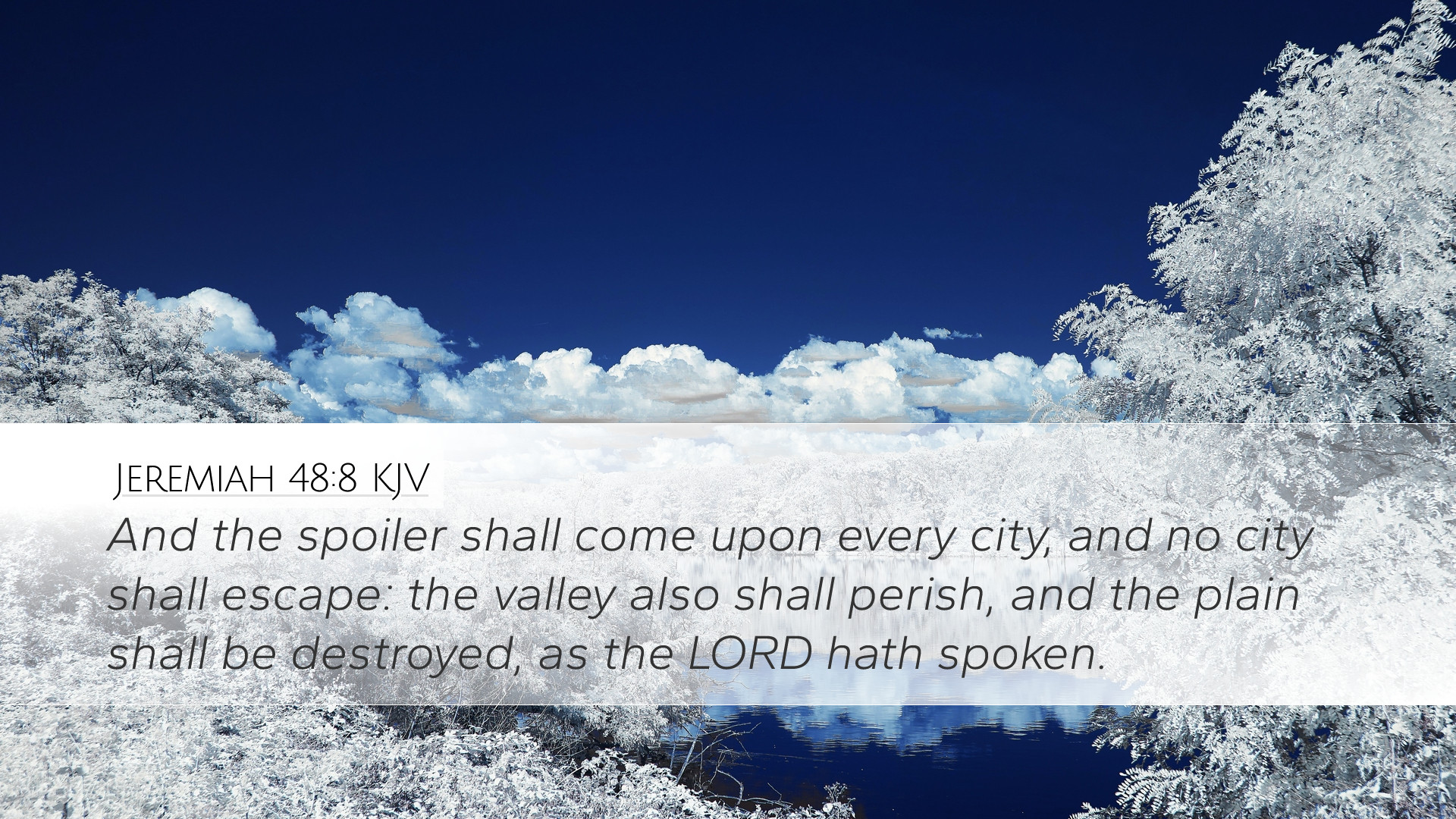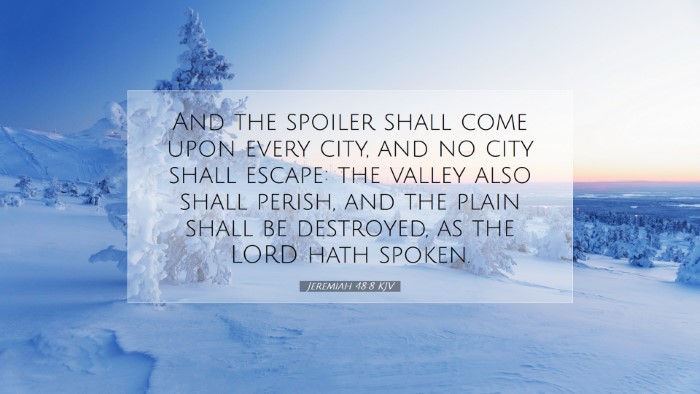Commentary on Jeremiah 48:8
Jeremiah 48:8 states: "And the cities shall be destroyed, and the choice young men shall go down to the slaughter,". This verse speaks to the prophetic judgment upon Moab for their sins and the desperate consequences that would follow. As we explore the insights from various public domain commentaries, we can provide a depth of understanding for pastors, students, theologians, and Bible scholars alike.
Contextual Background
Jeremiah prophesied during a tumultuous time in Israel's history, specifically addressing nations surrounding Israel, including Moab. The prophecies against Moab are part of God’s judgment on nations that opposed His people and engaged in idolatry and pride.
Commentary Insights
Matthew Henry
Matthew Henry emphasizes that the judgment upon Moab is illustrative of divine justice against nations that oppose God’s mandate. In his commentary, he notes:
- The Coming Destruction: Henry asserts that the verse highlights the destruction of cities, portraying the physical and social devastation due to warfare and divine wrath. Moab’s cities, previously bastions of pride, would lie in ruins.
- Loss of Young Men: The reference to young men going down to slaughter indicates the tragic loss of potential and vitality. Young men symbolize strength and future prosperity, indicating that Moab’s annihilation would prevent any hope of recovery.
Albert Barnes
Albert Barnes provides a historical lens to understand the prophecy. He writes:
- Historical Context: Barnes identifies that Moab was a significant adversary to Israel, arising from ancient enmity. The slaughter represents not only physical death but also the spiritual ruin that accompanies national sin.
- Divine Sovereignty: Barnes underscores that this destruction is an aspect of God’s sovereignty. God is depicted as ruler over nations, and His judgments are sure and just, reinforcing the importance of recognizing divine authority.
- Implications for Judah: While the focus is on Moab, Barnes stresses that the prevailing judgment serves as a warning to Judah and others. It reminds the faithful of the consequences of turning away from God.
Adam Clarke
Adam Clarke provides a more detailed exegetical approach. He interprets the passage as follows:
- Symbol of Judgment: Clarke points out that the ‘choice young men’ is not merely an indication of slaughter but symbolizes the complete loss of a nation’s strength. The elite of Moab are depicted as helpless before God’s judgment.
- Morality and Accountability: Clarke places emphasis on the moral failure of Moab. He discusses how their idolatry and neglect of true worship led them to this catastrophic end. This serves as a theological principle for all nations in terms of their accountability before God.
- A Call to Repentance: Clarke's commentary implies a call to repent. The patterns of sin and its consequences remain relevant, encouraging present-day believers to reflect on their standing before God.
Theological Themes
- Judgment: The overarching theme throughout the commentaries is the divine judgment upon sin. This verse serves as a sobering reminder of the consequences of turning away from God.
- National Consequences: The collective fate of Moab illustrates how a nation's moral and spiritual condition impacts its people. As leaders and citizens stray from righteousness, they ultimately face dire repercussions.
- Hope in Restoration: Even in judgment, there is an underlying theme of hope for restoration, which can be a source of comfort as it assures the faithful that God’s justice leads to eventual peace and restoration for those who turn back to Him.
Practical Application
For pastors and scholars, the lessons from Jeremiah 48:8 extend beyond historical judgment to current applications:
- Call to Holiness: This passage encourages both individuals and communities to pursue holiness and integrity, recognizing that neglecting these virtues carries consequences.
- Leadership Responsibility: Those in positions of influence should heed the warning that their actions can lead nations or communities toward devastation or restoration.
- Message of Hope: Amidst the themes of judgment, believers can find assurance in God’s sovereignty and a call to return to faithful worship. The eventual restoration beyond judgment can inspire hope in those who repent.
Conclusion
Jeremiah 48:8 offers a profound message about the fate of Moab and serves as a mirror reflecting God’s righteous judgment over sin. Through the insights of various commentaries, we gain a richer understanding of the implications for both ancient and modern readers. This verse becomes not only a historical account but a theological groundwork for understanding divine justice, moral accountability, and the hope of redemption in Christ.


